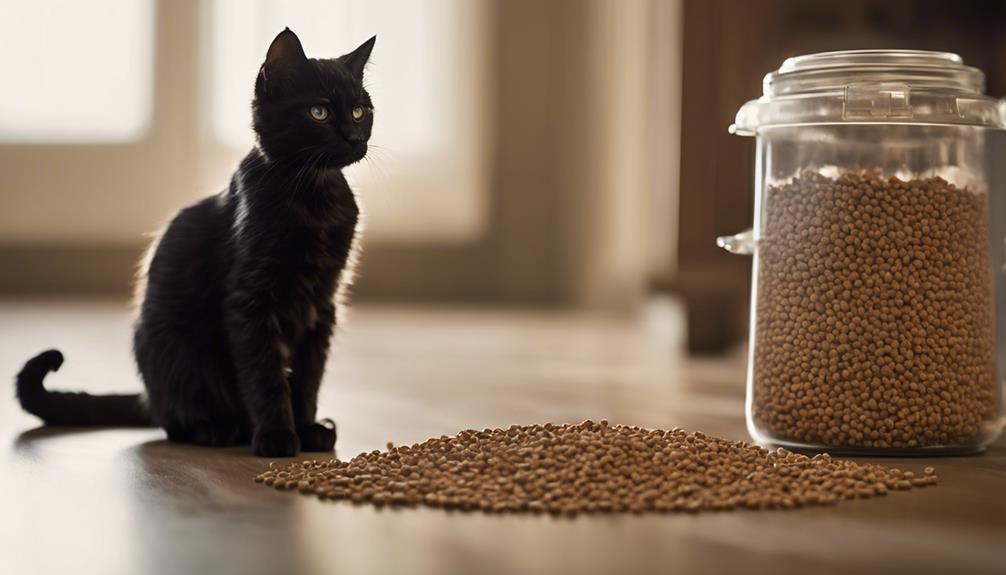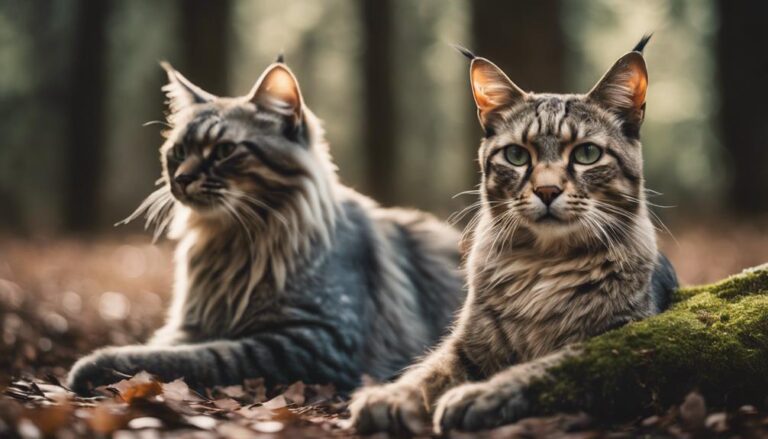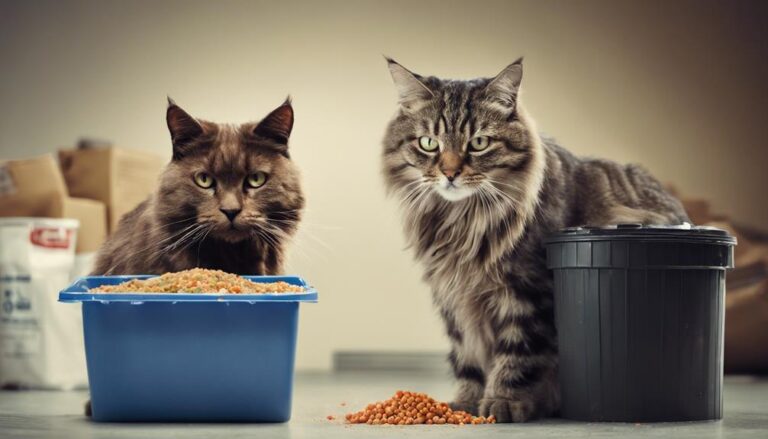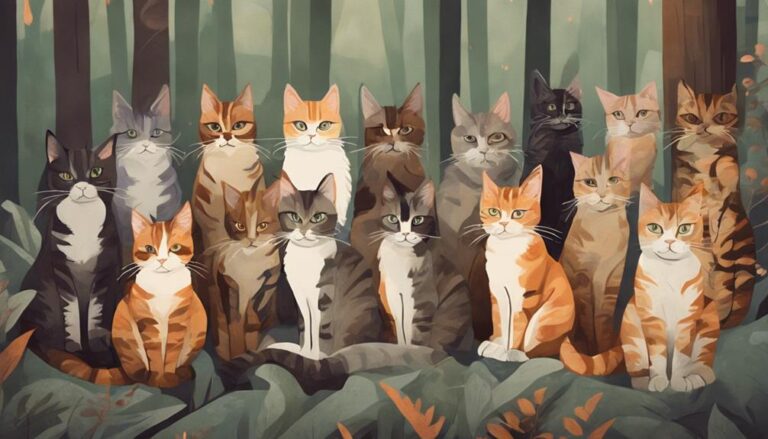You might be wondering if it's okay to feed your adult cat the same food you gave them as a kitten. After all, they seem to love it, and it's convenient to stick with what you know. But before you make that decision, consider this: kitten food is formulated to support rapid growth and development, which means it has higher levels of protein, fat, and certain vitamins and minerals than adult cat food. Are you inadvertently putting your cat's health at risk by sticking with kitten food? There's more to the story – and crucial to grasp the implications before making a choice.
Nutritional Differences Matter
When you feed your adult cat kitten food, you're giving them a nutritional boost that's meant for rapid growth and development, not maintenance and wellbeing. Kitten food is formulated to support the unique needs of kittens, with higher levels of protein, fat, and certain vitamins and minerals. In contrast, adult cat food is designed to maintain the health and wellbeing of fully grown cats, with a different balance of nutrients to prevent obesity and maintain peak health.
The nutritional differences between kitten food and adult cat food are significant. Kitten food contains 35%-50% protein to support muscle growth and development, whereas adult cat food has a lower protein content of 25%-40%. Additionally, kitten food has higher levels of calcium and phosphorus to support bone growth, whereas adult cat food has lower levels to maintain bone health. Feeding your adult cat kitten food may seem harmless, but it can lead to nutritional imbalances that can affect their overall health. To guarantee the best possible outcome for your cat's diet, it is crucial to select the right food for your cat's life stage to verify they receive the nutrients they need to thrive.
Risks of Feeding Kitten Food
As you consider feeding your adult cat kitten food, you're taking a risk that can have serious consequences. You're exposing your cat to a range of potential health problems, from nutrient imbalances to weight gain and serious health complications. By understanding these risks, you can make a more informed decision about what to feed your feline friend.
Nutrient Imbalance Risks
Feeding your adult cat kitten food regularly can lead to a nutrient imbalance, putting their overall health at risk. This is because kitten food is formulated to meet the high energy needs of growing kittens, not adult cats. As a result, your adult cat may end up consuming too much of certain nutrients, such as protein, calcium, and phosphorus, which can lead to a range of health problems.
One of the primary nutrient imbalance risks is excessive weight gain, which can increase your cat's risk of developing obesity-related health issues. Additionally, a diet too rich in certain minerals can lead to urinary tract issues, such as kidney stones and crystals. Moreover, an imbalance of certain nutrients can also affect your cat's digestive health, leading to diarrhea, constipation, and other gastrointestinal problems. By feeding your adult cat kitten food, you're in effect depriving them of the balanced nutrition they need to thrive. It's crucial to stick to a high-quality adult cat food that's specifically formulated to meet their unique nutritional needs.
Weight Gain Concerns
By switching your adult cat to kitten food, you're inadvertently setting them up for a weight gain crisis, which can have long-term consequences for their overall health and wellbeing. Kitten food is formulated to support rapid growth and development in kittens, not maintenance in adult cats, so it's no surprise that it can lead to excessive weight gain and obesity. In fact, you may be feeding your cat up to 30% more calories than they need, which can result in a rapid increase in weight and fat. This is especially problematic if your cat isn't getting enough exercise or has a sedentary lifestyle. A study by the American Animal Hospital Association found that adult cats fed kitten food were more likely to become overweight or obese, which can reduce their lifespan and quality of life. By feeding your adult cat kitten food, you're putting them at risk of weight-related health problems, including joint pain, arthritis, and decreased mobility. Crucial to prioritize your cat's health and wellbeing by feeding them a balanced, nutrient-rich adult cat food.
Health Complications Possible
You're not only risking weight gain and obesity by feeding your adult cat kitten food, but you're also exposing them to a range of potential health complications. The high-caloric density and nutrient imbalance in kitten food can lead to more serious health issues in mature cats.
Some potential health complications to ponder:
- Digestive upset: The higher fat content in kitten food can cause diarrhea or vomiting in adult cats.
- Urinary tract issues: An overload of calcium and phosphorus can lead to urinary tract problems, bone health issues, and other health complications.
- Kidney disease: Consuming kitten food long-term can put a strain on your cat's kidneys, increasing the risk of kidney disease.
- Heart disease: The high-fat content in kitten food can contribute to cardiovascular problems, increasing the risk of heart disease.
Feeding your adult cat kitten food can lead to nutritional imbalances, which can trigger a range of health issues. Obesity in mature cats is a significant concern, and feeding them kitten food can exacerbate this problem. It's vital to prioritize your cat's health and feed them a balanced, adult-formulated diet to minimize the risk of these health complications.
When Kitten Food Is Acceptable
In certain situations, kitten food can be a beneficial addition to an adult cat's diet, providing the necessary nutrients and calories to support their specific needs. For instance, adult cats require high-calorie kitten food when they're pregnant, nursing, or underweight. In these cases, kitten food's high-calorie density helps them meet their energy requirements. You may also consider feeding your senior cat (past 11 years) kitten food, as it's more palatable and calorie-dense, making it easier for them to meet their daily caloric needs. If your adult cat is a picky eater, kitten food can be a great option, as it's often more appealing to their taste buds. Additionally, if your cat is recovering from surgery or illness, kitten food's higher caloric density and nutrient content can aid in their recovery. Under your veterinarian's guidance, you can even use kitten food as an occasional treat or during training sessions, providing a nutrient boost and mental stimulation.
Special Cases and Exceptions
While kitten food can be beneficial for adult cats in specific situations, there are certain special cases and exceptions where it's not recommended or requires careful consideration.
If you're considering feeding your adult cat kitten food, you should be aware of the following special cases and exceptions:
- Senior cats: As your cat ages, their nutritional needs change. Senior cats may require joint support, reduced protein, and easier digestion. Kitten food is not formulated to meet these specific needs, so it's best to stick with senior cat food.
- Cats with kidney disease: Kitten food is high in protein, which can exacerbate kidney disease. If your cat has kidney disease, you should avoid feeding them kitten food and instead opt for a kidney-friendly diet.
- Cats with food sensitivities: Some cats may develop food sensitivities or allergies to certain ingredients in kitten food. If your cat is experiencing digestive issues or skin problems, you may need to switch to a different food.
- Cats prone to obesity: Kitten food is high in calories and fat, which can contribute to obesity in adult cats. If your cat is overweight or prone to weight gain, it's best to stick with a weight management adult cat food.
Transitioning to Adult Cat Food
As your kitten celebrates their first birthday, it's imperative to start shifting them to adult cat food to maintain a healthy weight and meet their evolving nutritional needs. This changeover is pivotal, as kitten food is formulated for rapid growth, which can lead to weight gain and other health issues if continued beyond adolescence.
To switch your cat successfully, doing it gradually is paramount. Start by mixing 3/4 kitten food with 1/4 adult cat food for a few days. Then, gradually increase the adult food ratio over 7-10 days to prevent digestive upset. Monitor your cat's behavior and adjust the transition pace as needed. If you notice any adverse reactions, slow down the process.
Prioritizing Adult Cat Health
As you consider feeding your adult cat kitten food, you're likely prioritizing their health and well-being. You're right to do so, since nutrient imbalances can have long-term consequences. Now, let's examine the key aspects of adult cat nutrition, proper food choices, and health risks prevention to safeguard your feline friend stays healthy and thriving.
Adult Cat Nutrition
You prioritize your adult cat's health by feeding them a nutrient-rich diet that meets their unique nutritional needs. As an adult cat owner, crucial to grasp is that their nutritional requirements are different from those of kittens.
- Protein intake: Adult cats require 25-40% protein in their diet to maintain muscle mass and prevent weight gain.
- Fat and calorie control: Adult cat food has lower levels of fat and calories to prevent obesity, a common health issue in adult cats.
- Vitamin and mineral balance: Adult cats have different vitamin and mineral requirements than kittens, and their food is formulated to meet these specific needs, including lower levels of calcium and phosphorus to maintain bone health.
- Tailored nutrition: Adult cat food is formulated to maintain the health and wellbeing of fully grown cats, with a different balance of nutrients compared to kitten food.
Proper Food Choices
Now that you understand the unique nutritional needs of adult cats, it's time to explore the proper food choices that prioritize their health. As a responsible cat owner, you want to guarantee your adult cat is receiving the right nutrients to maintain their overall wellbeing. Feeding your adult cat kitten food can be detrimental to their health, as it's formulated for rapid growth and development, not for maintaining health. Adult cats require a different balance of nutrients, with lower levels of fat and protein, to prevent obesity and maintain overall health.
To prioritize your adult cat's health, it's crucial to provide a balanced diet that meets their specific nutritional needs. Look for adult cat food that's formulated to support their unique requirements. Avoid feeding your adult cat kitten food, as it can lead to weight gain, digestive upset, and other health problems. By choosing the right food, you can guarantee your adult cat receives proper nutrition, leading to peak health and wellbeing. Remember, your adult cat's health depends on the food you provide, so make informed choices to give them the best possible life.
Health Risks Prevention
Feeding your adult cat kitten food can have devastating consequences for their health, including a heightened risk of obesity, chronic diseases, and a range of other serious health problems. By doing so, you're putting your cat's overall well-being in jeopardy.
4 key health risks to ponder when feeding your adult cat kitten food:
- Weight Gain and Obesity: Kitten food is formulated to support rapid growth, which means it's high in calories. If your adult cat consumes these excess calories, they'll likely gain weight, increasing their risk of obesity and related health issues.
- Nutritional Imbalances: Kitten food lacks the balanced nutrient profile adult cats need, leading to digestive issues, urinary tract problems, and other health concerns.
- Accelerated Growth and Joint Problems: Feeding your adult cat kitten food can accelerate their growth, exacerbating joint problems or predisposing them to musculoskeletal issues.
- Dental Health Issues: The softer texture of kitten food doesn't provide the necessary dental benefits for maintaining oral health, leading to dental problems and other issues.
Prioritize your adult cat's health by choosing a balanced, nutrient-rich adult cat food that meets their unique needs.
Frequently Asked Questions
Can Grown Cats Eat Kitten Food?
You're wondering if grown cats can eat kitten food, and the answer is yes, but it's not ideal. Kitten food is formulated for their high energy needs, which can lead to weight gain and nutrient imbalances in adult cats.
Is It Okay to Feed Senior Cats Kitten Food?
You're wondering if it's okay to feed senior cats kitten food? Yes, it can be beneficial for seniors with decreased appetite, but consult your vet first, as kitten food may not meet their specific nutritional needs.
Can I Give My Cat Kitten Food to Gain Weight?
You're considering kitten food to help your adult cat gain weight, but it's not the best option. Kitten food is formulated for rapid growth, which can lead to nutritional imbalances and health risks in adult cats.
How Long Should a Mother Cat Eat Kitten Food?
You'll typically feed your mother cat kitten food for 3-4 weeks after giving birth, then gradually shift her to adult food around 4-6 weeks post-whelping, depending on her age, health, and litter size.






